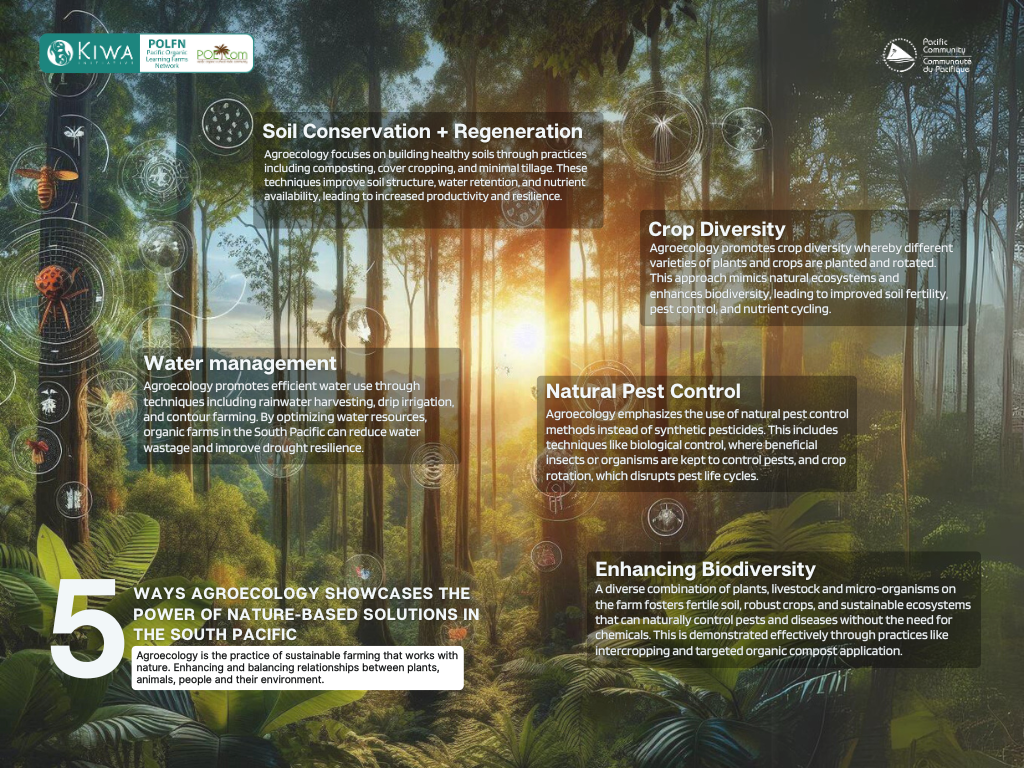
Agroecology is farming sustainably in harmony with nature. As our Pacific Island farmers know, it is a comprehensive approach that harmonises aspects of ecology, economics, and culture or tradition on their farms.
Since World War II farmers have increasingly become reliant on chemical inputs promoted heavily by Agro-industrial corporations and Universities. These chemicals have been proven to not only harm the soil and its ecosystem but also have long-lasting negative impacts on farmers and consumers. In a recent example, 60 countries, including Fiji and other Pacific Island nations, have banned the herbicide, Paraquat. Paraquat has been linked to the development of Parkinson’s disease, non-Hodgkin lymphoma, childhood leukemia, and other health issues. The excessive use of chemical weedicides and herbicides, which are almost saturating soil ecosystems, will be a significant factor in the inability to regenerate soils in the Pacific region. When combined with the unpredictable weather in the region, including tropical cyclones and heavy rain, this has created a multi-layered set of challenges for farmers, the agriculture industry, and Pacific Island leaders.
In response to these challenges, the Pacific Community (SPC) through the Pacific Organic Learning Farms Network (POLFN) Project is urging small-holder farmers to use simple organic farming methods that work in harmony with Pacific Islanders’ traditional knowledge and modern organic principles. POLFN is operating in Tonga, Fiji, Solomon Islands and Nauru through its newly established Organic Learning Farms that were launched in 2023. These Learning Farms are training over 300 small-holder farmers this year in farming methods that provide nature-based solutions to the unique agricultural and climate contexts of the Pacific region.
Mr Jim Pierce, the Coordinator of the Pacific Organic and Ethical Trade Community (POETCom) that oversees the POLFN Project at SPC states, “By starting with time-tested traditional knowledge and blending it with scientific agroecological principles, the Pacific Organic Learning Farms Network is equipping smallholder farmers with tools and techniques to build food systems that are environmentally sustainable, socially just, and economically viable – an organic farming model that could be replicated across the South Pacific”.
The five nature-based solutions seen in the infographic are not only safeguarding local livelihoods and food security but also contributing to the overall biodiversity and ecological health of these unique island communities.
About POLFN:
The POLFN Project is supported by the Kiwa Initiative, which is a multi-donor programme that aims to build resilience to climate change through Nature-based Solutions (NbS). It is funded by the European Union, Agence française de Développement (AFD), Global Affairs Canada (GAC), Australia’s Department of Foreign Affairs and Trade (DFAT) and New Zealand’s Ministry of Foreign Affairs and Trade (MFAT). Kiwa’s implementing partners include the Pacific Community (SPC), the Secretariat of the Pacific Regional Environment Programme (SPREP) and the Oceania Regional Office of the International Union for Conservation of Nature (IUCN).
About POETCom:
The Pacific Organic and Ethical Trade Community (POETCom) is the peak body for the organic movement in the Pacific region with active members, farmer associations, farmer support organisations, NGOs, the private sector, research institutions and works with governments across the Pacific Island region. POETCom is hosted by the Land Resources Division of the Pacific Community (SPC) in Suva, Fiji.
For more information, visit:
Contact: Viimaina Tamata, POETcom Communications Assistant at SPC | vilimainat@spc.int